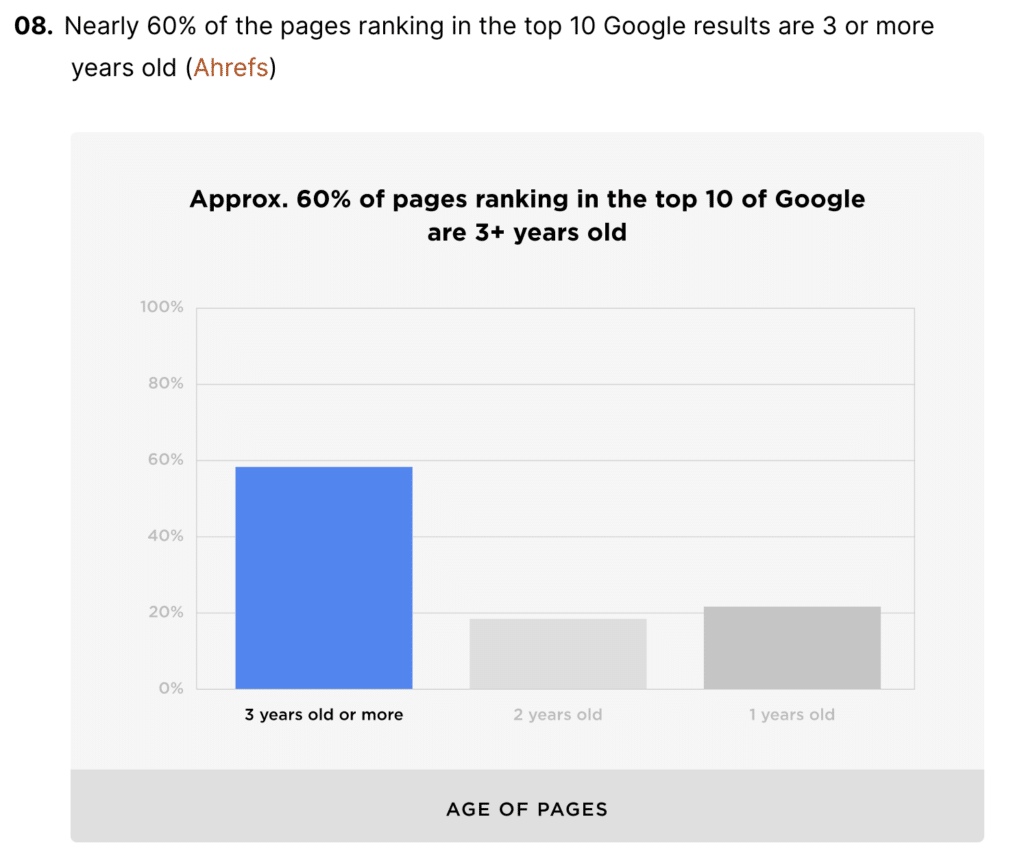One of the questions we get asked the most by clients who come to us for SEO help is… drum roll, please!
“How long does SEO take”?
Well, how long does SEO take?
Before we delve into the intricacies of the question and its answer, you need to realize a critical fact about SEO — rankings can never be guaranteed. And that’s coming from Google.
If any agency or SEO professional guarantees ranking in a specific period, run as far away as you can from them. This is because SEO is a long-term game with many internal and external factors that will affect your ranking.
So, what’s the real answer regarding how long SEO takes?
In short, Google states that it takes anything from 4-12 months to start seeing significant results when getting help from an SEO.
How long will SEO take for you?
This article will give you some guidelines on what to expect. This will help you make an educated estimation of when you can start seeing results.
What We Know
What do we know about how long it takes to see your B2B SEO strategy results?
For one, SEO takes a lot of planning and strategizing if you’re to get to the first page of SERPs. This means the preliminary stage alone takes time.
Secondly, you can’t determine when search engines will crawl and index your site — even when you put in a request.
Also, once you implement your SEO campaign, there are many factors to consider that determine how and when you’ll rank. Don’t worry — we’ll talk about these in a moment.
Having said all that, the general answer to how long SEO takes is anything from six months to a year or more. However, there are some outliers that can see results in under six months, as seen in this study by Ahrefs.
How do they do it?
As said, there are many factors involved. However, one of the main ones is hiring an SEO who knows what they are doing. And if you’re in a complex and competitive industry like SaaS, you need to know how to hire an SEO agency that understands SaaS.
One Thing Is Certain – SEO Is a Long Game

According to Backlinko, the length content exists matters.
And it matters a lot.
On average, almost 60% of the content found on page 1 have existed for more than 3 years. This tells us that rapid-fire posting for the sake of keywords is not your friend. What matters most is consistent and strategic content creation!
Factors that Affect Performance Timeline
I’ve made a lot of references to factors that affect SEO.
But what exactly are those factors, and how do they affect the performance timeline?
Let’s briefly look at the most prominent ones.
Age of Your Domain
One of the first and most important factors that determine how fast you’ll rank is the age of your domain. Let me be quick to qualify this statement. The age of a website alone is not a significant contributing factor to how long it will take for you to rank. However, the activities you do in that time do. A couple of the most important activities include:
- Organic links (which build over time)
- Creating high-quality content
- Actively promoting your content
These will help boost your domain authority; a crucial element search engines use to rank pages.
Existing Link Profile
Links are one of the most essential ranking factors search engines use. That’s why your existing link profile plays a significant role in your SEO performance timeline.
Link profile refers to the makeup of links pointing to your site. Search engines prefer a link profile made up of links from different websites. But most importantly, you must ensure most of your links are from high authority sites.
With a healthy link profile, ranking becomes easier. However, if your existing link profile is weak, you’ll have to design and implement a link building strategy to beef up your link profile.
Existing Content
The existing content on your site also plays a role in how fast your SEO efforts will pay off. One reason is that your content has already been crawled and indexed. All you need to boost its chances of ranking are a few strategic tweaks like:
- Building more backlinks
- Updating it with newer information
- Building strategic internal links links
Updating your existing content to meet Google’s Quality Rater Guidelines, particularly E.A.T, will help you rank faster than someone starting their content marketing from scratch. And if you’re in a technical industry like SaaS, you need to know how to create effective SaaS content.
Existing Technical Performance and Website Structure
Your website’s technical structure and design are other factors that determine how fast your SEO will take. These make up a large part of your technical SEO.
If not properly handled, these technical aspects can slow down your progress and result in poor ranking. Examples of such elements include:
- Site speed
- Website structure and navigation
- Broken links
- Whether your site is mobile-responsive or not
Especially with Google announcing that page experience is now a huge ranking factor, optimizing for technical SEO has become crucial to ranking.
Competitive Landscape
While most factors that affect SEO are in your control, some just aren’t. Well, not directly, at least. One of those is the competitive landscape.
How fast you rank depends on how competitive your niche is. But, more importantly, it depends on the keyword difficulty of the terms you’re trying to rank for.
To improve your chances of ranking faster, conduct a competitor analysis. Look for content gaps and low-hanging keywords that others are missing. Create quality content around these. Then, as they rank, you can pass link juice to other pages.
The bottom line — if you’re in a competitive market, it will definitely take longer to rank. The opposite is also true.
How You Leverage Data & Analytics
To see SEO results faster, you need to start your campaigns off on the right foot. And one of the best ways to do so is to have enough analytics data in place. This will enable you to run data-driven campaigns that are targeted and effective. A few tools you can use for this include:
These are just a few examples. Whichever tool you have access to, make sure to utilize it to gather as much data as possible for your campaigns.
Budget & Internal Resources
One of the biggest misconceptions business owners and marketers have is that SEO is free. Sure, organic traffic is free, but opening the tap for that organic traffic to start flowing comes at a cost.
The performance of your SEO campaign is directly affected by your budget and internal resources.
The bigger the budget you allocate to your campaign, the more likely you’ll see results faster. This is because you can easily scale some essential elements of SEO like:
- Content creation
- Link building campaigns
- Content promotion
To better understand how much to budget for your campaign, spy on your competitors and see how much they spend to rank. Of course, the more aggressive your competitors, the more you’ll have to spend to compete.
Seasonal Trends & Market fluctuations /Demand
Your SEO results can be impacted by seasonal trends depending on your product or market. For example, if your product is tax software, you’ll see a rise in demand and traffic during tax season.
Does this mean you should focus your energy on these seasons?
Not at all. A savvy SEO will start implementing their campaign way before the seasonal fluctuation. This will help ensure that you rank well by the time demand for your product is high. As a result, you’ll enjoy faster results during peak season.
High-Level Typical Timeline for SEO Results
How long does SEO take?
We’re now ready to answer this question by giving you an estimated timeline of what to expect. Of course, the results you see are tied to your (or your SEO’s) knowledge and any SEO implementations you have in place. If you’re in the B2B space, you must use an SEO specialized in offering B2B SEO services.
So, what can you expect after kicking your SEO campaign into action?
First 1-2 Months
The first couple of months should be dedicated to laying the groundwork for your campaigns. Doing this involves:
- Knowledge gathering: Collect as much information as you can about your product, market, and target audience. Every piece of information is crucial to directing your campaigns.
- Research and analysis: Use analytics tools to research keywords, competitors, and your website’s performance.
- Creation of strategy roadmap: Audit your content and create a content marketing strategy.
Never make the mistake of rushing through these activities just to get your SEO results faster. These foundational activities can make or break your campaign.
Months 3-6
Months 3-6 are when you start putting your campaign into action. Some of the most important activities at this stage include:
- Optimizing existing content: Optimizing existing content and implementing on-page SEO best practices.
- Technical SEO improvements: Update your website and fix any performance issues to ensure it offers a great user experience (UX).
- Pillar content asset creation: Using the data from the research phase and your content strategy, create pillar content optimized for search engines and users.
A lot of work goes into ensuring you successfully implement these elements. Take care to ensure everything is expertly carried out.
Months 7-10
SEO is an ongoing process. That’s why months 7-10 are more of an extension of the previous months. Activities to focus on include:
- Ongoing on-page SEO improvements
- Adding more content assets
- Keyword rank and organic user count tracking
- Improvements to the above KPIs
Months 7-10 are a hybrid of content creation and improvement as well as tracking performance.
Months 11-16
Months 11-16 should focus more on tracking and monitoring your progress thus far. Notable things to monitor include:
- Noticeable improvements in business metrics
- SEO and content strategy evaluation
- How you fare against the competition
Using the data you gather in these months, you are in a better position to make decisions concerning which direction to take your campaign. If results aren’t pleasing, you can pivot and re-strategize. However, if you’re happy with the results, you can choose to continue the existing campaign.
As you can see, SEO is not an activity that brings overnight results. Instead, you must be patient and give it time to bear fruit.
Info Needed to Estimate How Long SEO Might Take for Your Campaign
I’m sure by now you’re better able to estimate how long SEO may take for you. Just to reiterate, here’s some of the necessary info you need to estimate how long SEO will take for you:
Check Out Your Competitors
One of the best ways to estimate how long SEO will take for you is to check out your competitors. Using tools like Ahrefs or Similarweb, you can conduct competitors’ analysis and trace how long it took them to rank for the particular keywords you’re targeting. Then, you can use their trajectory to estimate how long your progress should take.
Determine How Many Content Assets Your Competitors Rank For
Besides checking the number of keywords your competitors rank for, you should also ascertain the number of content assets ranking for those terms. This will help you know how much work you have cut out for you regarding content creation.
Conduct Backlink Analysis
Because backlinks play a vital role in how search engines rank content, it’s essential that you conduct a backlink analysis on your competitors’ websites. This will help you have an idea of how many backlinks you need to build to rank. Take particular note of the number of do-follow backlinks, as these carry more weight.
Identify Gaps in Your Strategy
Compare your SEO strategy to that of your competitors and identify gaps in your strategy. Working on these will help you get better results faster. Again, you can use tools like Ahrefs to help you identify these.
Consider Your Budget
As seen earlier, your budget plays a significant role in how fast you see SEO results. Depending on the competitive nature of the market and how much work is needed to catch up to your competitors, you can consider re-evaluating your budget or keeping it the same. Some aspects to consider as you determine your budget include:
- Do you have an existing asset or need to make one?
- Do you have any existing links or need to create them?
- Do you have someone in-house who could do this, or do you need to hire?
Don’t be afraid of spending a lot on SEO. It will result in you generating inbound leads faster. It will also help ensure that you continue being relevant in search for a long time. And one of the biggest advantages of SEO over paid traffic generation strategies like PPC is that SEO continues bringing in results long after the campaign is over.
Big Takeaway
So, how long does SEO take?
I’m sure by now you’ve realized that SEO is a long-term game that produces long-lasting results. And because a lot goes into planning, executing, and monitoring an SEO campaign, it can be expected that seeing results takes time.
Hopefully, this article has helped you get a glimpse of what goes into executing an effective SEO strategy and the timeline it takes to start seeing results. I’m also sure you’ve seen that it takes a lot of effort, knowledge, and expertise to execute a successful campaign.
If you don’t have the time and expertise to run your own SEO campaigns, don’t worry. You can always outsource to a reputable SEO agency. And if you’re in the SaaS or B2B industry, that’s our specialty. So go ahead and get in touch with our SEO Services. We’ll help you design and execute an SEO strategy that will give you an edge over the competition.




